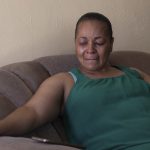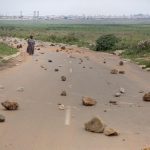Blood in the backstreets
When impoverished people trying to access water or land are killed by the police, the whole of society is complicit in these contemptuous murders committed by the state.
Author:
5 March 2019

Speaking to the press shortly before the non-violent protests against the pass laws planned for 21 March 1960, Pan Africanist Congress president Robert Sobukwe declared that “we have sworn that we are leading them, not to death, but to life abundant.”
The fact that 69 people lost their lives at the hands of the state in Sharpeville that day, and another three in Langa, is one thing. The fact that the state continues to murder protestors a quarter of a century after the end of apartheid is another.
The human rights written into law, and now celebrated with a national public holiday on the anniversary of the massacre at Sharpeville, have not come to mark a fundamental break in the ways in which impoverished black people are governed in South Africa.
When the protestors reached the police station in Sharpeville on a Monday morning in March 1960, they were met with police officers in British-made Saracen armoured cars. In February, the eThekwini Municipality took delivery of three of the four casspirs it has bought to combat road blockades and land occupations. This was a decision to return to explicitly colonial forms of policing the impoverished majority.
Related article:
In Durban, occupations such as Marikana in Cato Crest and eNkanini in nearby Cato Manor have successfully occupied and held land. But the price, as shack dwellers’ movement Abahlali baseMjondolo have often noted, has been paid in blood.
The Marikana occupation is, like a number of land occupations around the country, named after a state massacre. It has two sections. One is named in honour of Nkululeko Gwala, a local activist assassinated in 2013. The other is named after Nqobile Nzuza. She was murdered, also in 2013, by the police while on a road blockade organised to defend the occupation against repeated violent and unlawful attempts at eviction by the local state.
The politics that develops in struggles like these is saturated with an awareness of death, and the inevitability of violence and suffering. The route to land, and the possibilities of the city, is understood to be forged in a perilous passage through collective suffering.
Neglect and contempt
On Tuesday 26 February, New Frame published an article by Selloane Khalane about two activists killed by the police during protests. Andries Tatane was killed in Ficksburg, in the Free State, in 2011. Kitlano Leeuw was killed during a protest in Taung, in the North West province, in April last year. No one has been held accountable for either of these killings, and in both instances the systemic neglect and contempt that led people to decide to take to the streets has not been addressed.
Related article:
These were not anomalous events. A quick scan of online newspaper reports, hardly a comprehensive data set, indicates that the police have killed much more than 50 people, many of them not even named, during protests since 1999. No doubt a credible study would throw up many more cases.
Now, during the month in which we observe Human Rights Day, we publish a searing article by Nation Nyoka on the death of Steven Kau on the dismal post-industrial wastelands of Johannesburg’s East Rand. In January, the police allegedly shot Kau multiple times during an attack on a land occupation there, which is now named for Kau.
Related article:
When it comes to the question of land, the nationalist imagination tends to dwell in the countryside more than the city. But there is a history of urban aspiration, too.
In his famous speech given at Columbia University in New York in 1906, one of the original founders of the ANC, Pixley ka Isaka Seme, spoke of the “brighter day … rising upon Africa … reflecting the glory of the rising sun from the spires of their churches and universities”.
These aspirations for abundant life and shining cities have come to nothing.
Police killings
In 1961, Frantz Fanon, dictating his last book from a mattress on the floor of a flat in Tunis, observed that “the Sharpeville massacre shook public opinion for months. In the press, over the airwaves and in private conversations, Sharpeville has become a symbol.” More recently, in many countries, individual deaths at the hands of the police have done the same.
When the police shot and killed Carlo Giuliani in 2001 during a protest against the G8 Summit in Genoa, Italy, his name rushed around the world. When Zyed Benna and Bouna Traore were electrocuted to death, and Muhittin Altun seriously injured, while fleeing the police in Paris in 2005, the city burnt for three weeks and riots spread to hundreds of cities and towns across France. Within an hour of Andreas Grigoropoulos losing his life to a police bullet in Athens in 2008, the city was convulsed by protests that rapidly spread across Greece and continued for two weeks. In 2014, people around the planet could speak the names of Michael Brown, Eric Garner and Tamir Rice in the way that Catholics say the rosary. A powerful movement developed as people across the United States, and elsewhere in the world, said their names.
The killing of Tatane received some media coverage and a few days of national attention because it was filmed and screened on national television. The Marikana massacre became global news, and then a global symbol of just how rotten the ANC had become.
Name the dead, shame the complicit
But in most cases when the police murder an unarmed person struggling for water, or a patch of land, or to stop an armed attack by the state on their fragile home, few of us can say their name. If there is a protest or a riot, it will almost certainly be confined to the same streets where the murder happened. No national movement will emerge. No government will fall. It’s highly unlikely that bureaucratic and legal processes will result in anyone being held accountable.
It is, of course, necessary to hold the ANC accountable for every person the state has murdered. It is equally necessary to see the party for what it is. But we also need to be aware that the complicity with the way that colonial methods of policing have been sustained a quarter of a century after apartheid, and the contempt for the lives, strivings and struggles of impoverished black people that has enabled this, is a general complicity.
Party politics in general, along with much of the academy, the churches, the media, the elite public sphere more broadly and, indeed, society as a whole is as marked by this contempt as the ANC.
In 1961, Fanon wrote that in the settler colony, “the town belonging to the colonised people … is a place of ill fame, peopled by men of evil repute. They are born there, it matters little where or how; they die there, it matters not where, nor how.” In 2019, this is a perfect description of our condition.



